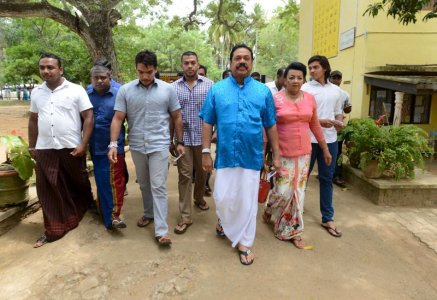Sri Lankan prime minister defeats former president in elections
Sri Lanka’s ruling United National Party won the most seats in the elections, blocking former President Mahinda Rajapaksa’s attempt to return to power.
His main rival, prime minister Ranil Wickremesinghe, met with campaign workers on Tuesday as his UNP party celebrated their victory and is expected to form the next government.
“I invite all of you to join hands”, Wickremesinghe today said in a statement as the count neared completion.
A political party or a coalition must have at least 113 seats to form a government, meaning Wickremesinghe will have to seek some support from other parties.
Elections Commissioner Mahinda Deshapriya said he expected the release of the final party positions by midday Tuesday, while individual votes garnered by candidates would be announced later.
If initial trends are confirmed, the results would mark a triumph for President Maithripala Sirisena, who beat Rajapaksa in a presidential election in January and called early parliamentary polls to secure a stronger mandate for reforms.
Sirisena, who has promised a probe into allegations of the massacre of ethnic Tamil civilians by troops under the former president, recently sent a letter to Rajapaksa, saying he would not appoint him prime minister even if he secures a majority in the parliament.
“There will be a few days yet before we see the future face of the government here in this country”, our correspondent said.
Former President Mahinda Rajapaksa said his “dream” of making a political comeback is over.
Wickremesinghe also received the highest ever preferential votes in Sri Lankan history with 550000 people marking their preference for him in his constituency Colombo.
President Sirisena voted in the north central town of Polonnaruwa while Prime Minister Ranil Wickremesinghe exercised his franchise here and expressed confidence over winning the polls.
Rajapakse’s United People’s Freedom Alliance (UPFA) came second with 95 seats, while the minority Tamil National Alliance (TNA) took 16 seats.
Wickremesinghe’s UNF won in 11 districts out of the country’s 22 districts while the UPFA triumphed in 8 and the TNA in 3 districts.
The election results showed that many even in Sinhalese majority areas who had backed Rajapaksa in the January presidential election, which he stunningly lost to Sirisena, had thrown their weight behind the UNF, which is allied with Sirisena.












